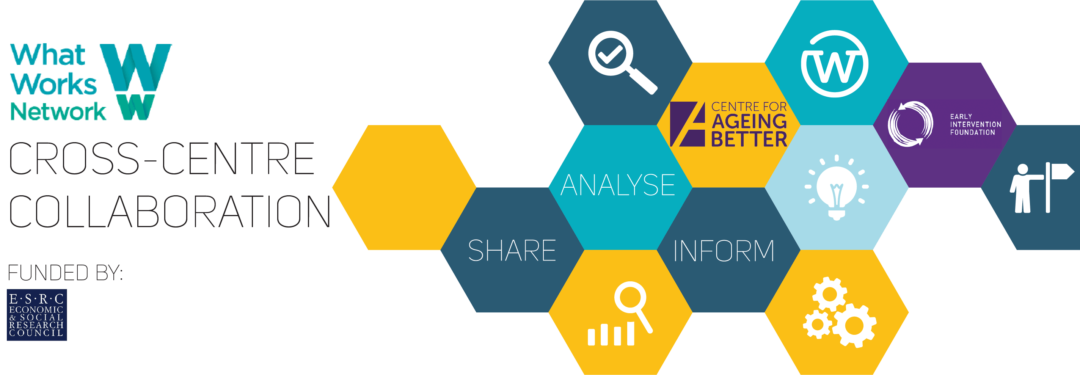Wellbeing across the lifecourse: the big picture

The Centre is part of the What Works Network, which work together to make evidence on ‘what works’ accessible for decision-makers across a range of sectors. This blog is a collaboration between different centres in the network. The Centre will also be holding an event as part of the All Party Parliamentary Group on Wellbeing Economics looking at measuring children’s wellbeing. Sign up to our evidence alerts to find out more about this and future events.
Things that affect our wellbeing at any point in our lives, tend also to have a big influence later on. So what impacts our wellbeing at different points in our lives? What are the patterns and common drivers of wellbeing through childhood, adulthood and later years?
Gathering evidence on wellbeing across the lifecourse is important to help answer these questions. And gathering it in a coordinated way across all the centres ensures the evidence is not conflicting or confusing for decision-makers. Some factors are universally important for wellbeing, across individuals, groups and cultures.
The importance of each factor differs from person to person, but we know, for example, that between 30% and 50% of the variation in our wellbeing depends on our genetics. That means 50% or more of the variation in our wellbeing can be influenced by our experiences in childhood, adulthood, and later life.
Childhood and adolescence
Childhood wellbeing has a value in itself, as well as in terms of predicting later outcomes in life. We know, for instance, that the best predictor of an adult’s life satisfaction is their emotional health at age 16.
There are many important interconnected family, community and society factors that affect childhood wellbeing, including relationships in family and support; maternal mental health; peers (including bullying); and material deprivation. The EIF are focussed on building and sharing the evidence on what works to tackle the factors that we have the power to change such as:
- Mental health and wellbeing
- Relationship skills can be ‘taught’, and there are long term payoffs and positive spillovers
- Effects of children that are peer-related, which tend to have large spillover effects.
- Parents ability to support the healthy development of their children’s social and emotional skills.
Mid-life adulthood
Our mental and physical health is important, as are our relationships, our sense of autonomy, purpose and security, and the chance to experience positive emotions. These aspects of our lives are influenced by:
Our environment
- Physical conditions such as pollution, green space, housing or commuting
Institutions and structures
- Social conditions, cultures and norms, including the time we have available; the availability of activities to participate in and, for example, heritage or sense of belonging; norms and beliefs
- Economic conditions, which in turn influence our prospects of meaningful employment, our sense of security and the opportunities and conditions in our local areas; institutions and structures, which influence employment and employment rights
- Systems for participation in decision-making
Our lifestyles, choice of activities – The way we choose to, or are able to, live our lives and the activities we take part in
How we experience our lives, and how this influences the way we respond to stressors, for example if we feel supported or are in therapy
Evidence from the Centre’s reviews suggests successful interventions can be designed to be most beneficial for wellbeing when they:
- focus on the quality of relationships
- balance belonging and inclusion
- consider autonomy, participation and control.
Later life
Evidence shows that the same things that matter for wellbeing in young and mid-life adults are important for later life too. This is particularly the case with health, relationships, financial security and a sense of meaning and purpose.
In general, people in old age tend to be happier. However, some people find the transition into older age challenging, particularly those who have experienced cumulative disadvantage through their adult lives. Functional impairments in later life can then create further barriers, particularly for people with low level of wellbeing. Disability has more of a widespread impact in later life, including, for example, in sustaining social connections. Addressing the drivers of wellbeing for people approaching later life, is therefore core the Centre for Ageing Better’s new strategy.
Social connections are a fundamental factor for wellbeing often overlooked in later life and our communities can play a key role in helping people connect. There are a range of community-led and community-based initiatives at a local authority level. Generally, the evidence base for these is weak. There is a need to fill gaps in the evidence, understand the active ingredients of these initiatives and help share the learning across communities.
